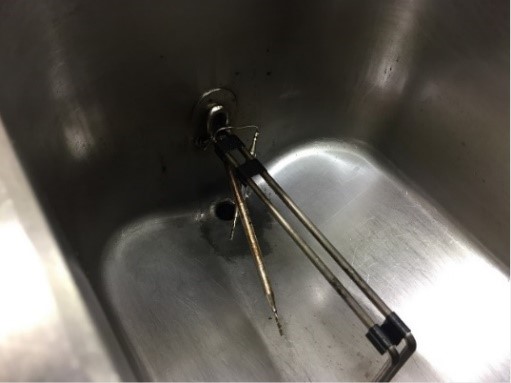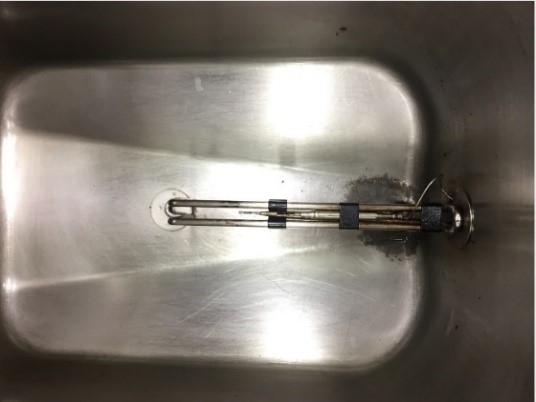Near miss: potential fire – overheating of oil in deep frying pan
What happened?
One of the engine room crew members came into the galley and noticed smoke coming from the oil which was in the deep-frying pan. The engineer, working with the cook who was in the galley during that time, checked the temperature of the oil in the deep-frying pan using a digital thermometer from the galley. The digital thermometer showed at out of range limit. The maximum for this thermometer was 200°C; therefore, the oil was above 200°C.
The deep-frying pan was switched off and a lock out/tag out was applied for further investigation. The frying pan was allowed to cool down and the oil drained out. When the oil from the deep-frying pan was cooled down and drained it was noticed that the temperature sensor elements of both thermostats were not in the original place.
After the temperature sensor elements were put back in the correct place, the deep-frying pan was filled with oil again; both thermostats (temperature control thermostat and safety/maximum temperature thermostat) were tested and found to be in good working order.


What went wrong?
- Temperature sensor elements of both thermostats were not fitted in the original place;
- The galley crew were not aware of the function of the temperature sensor elements inside the deep-fryer, nor of the potential consequences if those sensor elements were in the wrong place.
What were the causes?
- Lack of awareness;
- Lack of familiarity with equipment.
What actions were taken? What lessons were learned?
- Clear instructions provided for galley crew about the cleaning of a deep-frying pan, including ensuring that the galley crew are aware of proper positioning of the temperature sensors inside the deep-frying pan during the cleaning process, and know not to move them;
- Recommend check of positioning of temperature sensors on similar equipment in galleys on other vessels;
- On this specific vessel, replace thermostat sensors in the original position and check thermostats with a calibrated temperature probe.
Members may wish to refer to:
Safety Event
Published: 12 March 2019
Download: IMCA SF 04/19
IMCA Safety Flashes
Submit a Report
IMCA Safety Flashes summarise key safety matters and incidents, allowing lessons to be more easily learnt for the benefit of all. The effectiveness of the IMCA Safety Flash system depends on Members sharing information and so avoiding repeat incidents. Please consider adding safetyreports@imca-int.com to your internal distribution list for safety alerts or manually submitting information on incidents you consider may be relevant. All information is anonymised or sanitised, as appropriate.
IMCA’s store terms and conditions (https://www.imca-int.com/legal-notices/terms/) apply to all downloads from IMCA’s website, including this document.
IMCA makes every effort to ensure the accuracy and reliability of the data contained in the documents it publishes, but IMCA shall not be liable for any guidance and/or recommendation and/or statement herein contained. The information contained in this document does not fulfil or replace any individual’s or Member's legal, regulatory or other duties or obligations in respect of their operations. Individuals and Members remain solely responsible for the safe, lawful and proper conduct of their operations.
